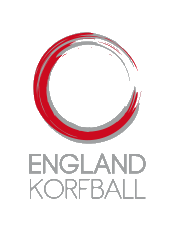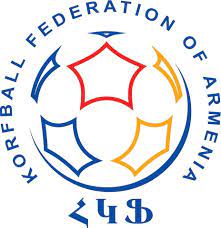
Korfball is a ball sport, with similarities to netball and basketball. It is played by two teams of eight players with four female players and four male players in each team. The objective is to throw a ball into a netless basket that is mounted on a 3.5 m high pole.
European Korfball Championship or European Korfball A-Championship is a korfball competition for European national teams organized by the International Korfball Federation. It was played every four years from 1998 until 2014 and then moved to a tournament every two years, starting from 2016. The number of participated teams has varied between 8 and 16. The Netherlands national korfball team has won each edition.

The Belgium national korfball team, nicknamed the Belgian Diamonds, is managed by the Koninklijke Belgische Korfbalbond (KBKB), representing Belgium in korfball international competitions.

The England national korfball team is managed by the English Korfball Association (EKA), representing England in korfball international competitions. In 2007 the Great Britain national korfball team was split into 3 national teams: England, Wales and Scotland, that compete in all international competitions except the World Games, where they compete as a unified Great Britain national korfball team.
The Catalonia national korfball team is managed by the Federació Catalana de Korfball (FCK), representing Catalonia in korfball international competitions.

The Russia national korfball team is managed by the Russian Korfball Federation (RKF), representing Russia in korfball international competitions.
The Slovakia national korfball team is managed by the Slovak Korfball Association (SAK), representing Slovakia in korfball international competitions.
The France national korfball team is managed by the UFOLEP National Korfball Committee, representing France in korfball international competitions.
The Luxembourg national korfball team was managed by the Federation Luxembourgeoise du Korfball (FLKB), representing Luxembourg in korfball international competitions. Currently there are no teams in Luxembourg
The Ireland national korfball team is managed by the Ireland Korfball Association (IKA), representing Ireland in korfball international competitions.

The Scotland National Korfball Team is managed by the Scottish Korfball Association (SKA), representing Scotland in korfball international competitions. It entered in competition in 2007, when the Great Britain National Korfball Team was split in 3 teams: England, Wales and Scotland.
The Sweden national korfball team is managed by the Svenska Korfballförbundet (SKF), representing Sweden in korfball international competitions.
The Serbia national korfball team is managed by the Korfbol savez Srbije, representing Serbia in korfball international competitions. Is member of IKF since 2005.
The Greece national korfball team is managed by the Hellenic Korfball & Ball-Sports Federation (HKBSF), representing Greece in korfball international competitions.
The Bulgaria national korfball team is managed by the Bulgarian Federation Korfball and Intercrosse, representing Bulgaria in korfball international competitions.
The Europa Shield is an annual korfball club competition by the International Korfball Federation. Clubs qualify for this competition based on their performance in their national leagues. Included are the second and third classified for the "B" countries and the first classified for "C" countries. It is the second-tier competition of European korfball clubs, ranking below the Europa Cup.
The IKF World Korfball Ranking is the ranking for national korfball teams, done by the International Korfball Federation.
The Turkey national korfball team is managed by the Turkish Korfball Committee (TKC), representing Turkey in korfball international competitions.
The Italy national korfball team is managed by the Federazione Italiana Korfball (FIK), representing Italy in korfball international competitions.

The Korfball Federation of Armenia (KFA), is the regulating body of korfball in Armenia, governed by the Armenian Olympic Committee. The headquarters of the federation is located in Yerevan.





